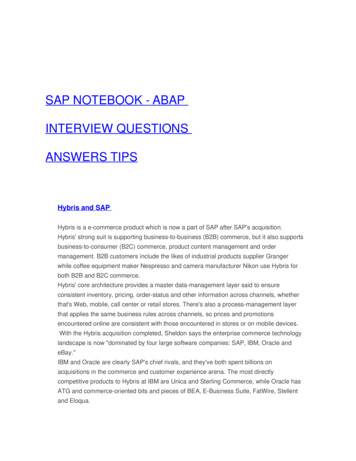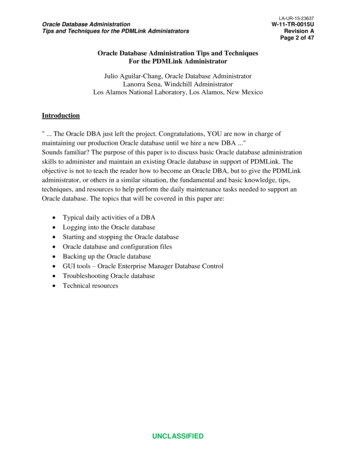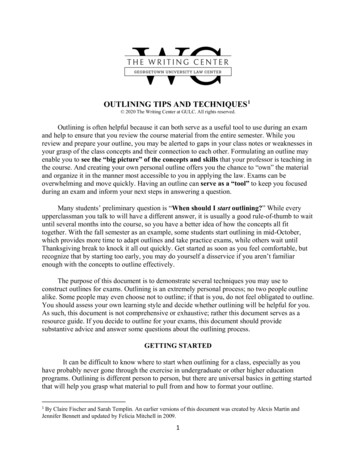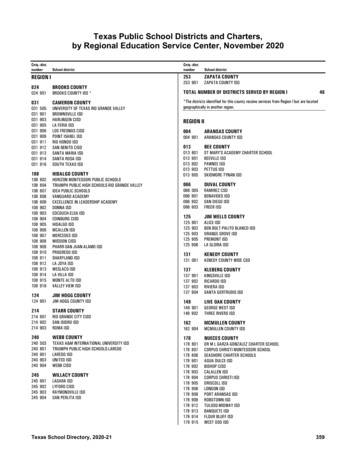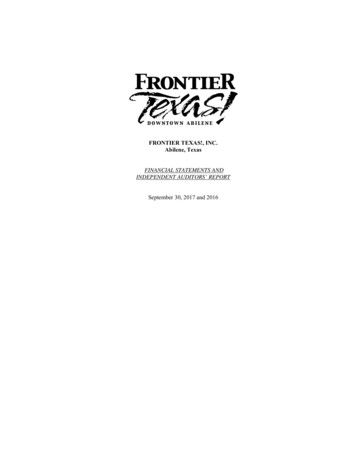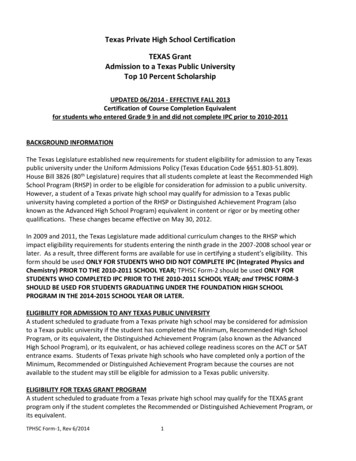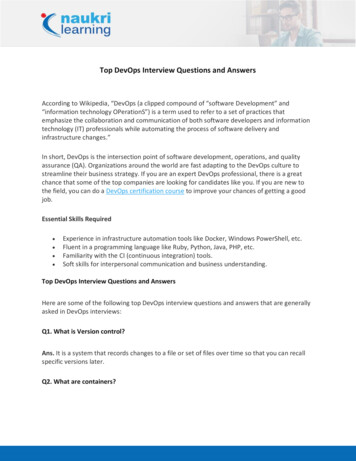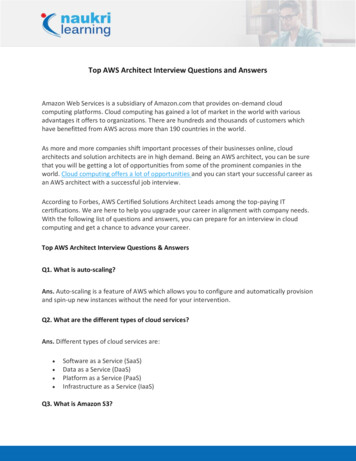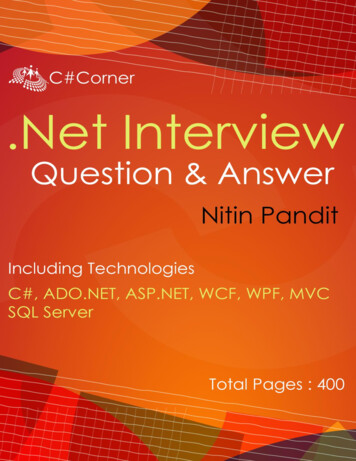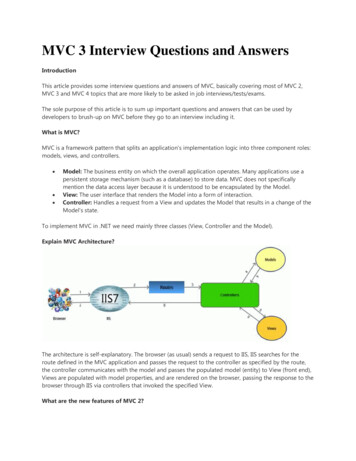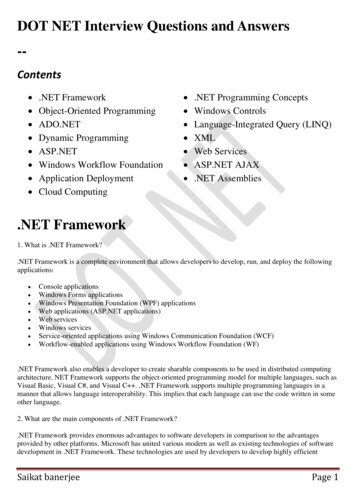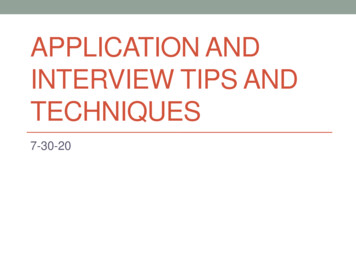
Transcription
APPLICATION ANDINTERVIEW TIPS ANDTECHNIQUES7-30-20
Overview Preparatory work Scheduling etiquette and strategy Attire Preview party Interview Follow up
PREPARATORY WORK
Preparatory work Apply to reach/target/safety programs – be open-minded AAMC – Careers in Medicine (https://www/aamc.org/cim/) AMA-FRIEDA – fellowship-database) ERAS – x.cfm) Doximity – (https://www.doximity.com/home) Professional societies with student memberships – ACP, ACS,ACOG, etc. Be sure your CV is accurate (i.e. no exaggerations) andcomplete - be prepared to talk at length about anything inyour CV or application during interviews Include education, research, publications, honors,leadership, employment, community service andinterests/special skills and/or hobbies
Preparatory work Start working on your personal statement NOW Be sure to address why you are choosing your specialty Talk with mentors/advisors on specialty-specific additions thatmight be beneficial to address Keep it around one page single-spaced Consider tailoring personal statement with program specifics forprograms in which you are very interested Avoid over-generalization if applying to both community-based anduniversity-based programs – be sure that all aspects of yourpersonal statements are congruous with the program to which youare applying - might want to avoid statements such as “ultimatelyplan to pursue an academic medicine career” or “seek programwith ample research opportunities” in PS to CBPs If applying out of state, might mention a reason you would bewilling to relocate from Texas Do not use PHI
Preparatory work Letters of recommendation Generally, you want your letters to be submitted by the timeprograms upload your ERAS application Start thinking about who you want to ask and how you want to ask– ask your mentors/advisors/residents who might be appropriate foreach specialty – typically someone who has worked with youclosely and can provide an insightful letter Be prepared to give your letter writers information about yourself(i.e. CV and personal statement) to help inform their letter writing The letters should be from within the past few months prior toapplication upload The same ”non-disclosure” option is in ERAS, so letter-writerssubmit the LOR directly and you can choose to relinquish your rightto review it (most applicants do)
Preparatory work Professional photo for ERAS Clean up your Facebook/Instagram/other social mediapresence NOW Purchase and tailor your interview and preview partywardrobe, including stylish but comfortable shoes and anextra blouse/shirt If it looks like some programs will host live interviews, buya carry-on with a suit compartment
Preparatory work Turn on “push” or “fetch” option on email settings on phoneSave an email template in “Notes” with blank spaces forperson’s and program/hospital name and your daterequest optionsHave another “Note” with all confirmed interview dates inchronological orderHave another “Note” with all ERAS/AAMC/NRMP ID #sand passwords- you may need these to respond to aninterview invitationConsider TSA pre-check, in-flight data plans, anddownloading travel apps (e.g. Kayak, Expedia, SWA) foreasy/fast access to flight times if live interviews are apossibility
Preparatory work Technology set-up Live vs. Asynchronous Virtual Interviews Stable internet connection with appropriate internet speed – checkinternet speed at SpeedTest.net; if home internet unstable, reserveroom on campus Computer or tablet with good webcam and microphone; make surethat video and audio are good quality; position camera a littlehigher than eye level, practice looking at the camera/move videowindow to top of call Identify a private, quiet, well-lit space in which to conduct yourinterviews, free of potential distractions (especially pets, children,etc.) and background noise, and with an outlet nearby Lighting is super-important – light source must be in front of you,not behind you Consider your backdrop – minimize distractions
Preparatory work Practice responding with the device you will be usingduring the interview – if program will be doing liveinterviews, practice with peers or advisors; for prerecorded interviews, practice on your own so you can getused to responding without an interviewer present Record yourself to get a sense of personal presentation Good resources: NY Times Wirecutter - “How to Pull Off a Professional Video Callfrom Home” ionalvideo-call-from-home/ NYTimes Wirecutter –”Look Better on Video Calls With These EasyLighting Tips” - lighting-tips/
Preparatory work Take some time to reflect upon your experiences andidentify your strengths Try to identify some situations that you think bestexemplify your knowledge and skills – in addition tostandard medical knowledge and patient care skills, thinkabout teaching, leadership, communication, resilience,research – especially quality and safety Discuss your experiences with your advisor to identifybest examples if needed Create a brief list of experiences that demonstrate yourskills and could be used to respond to different questions
SCHEDULING STRATEGYAND ETIQUETTE
Scheduling strategy and etiquette When invited to an interview: Respond ASAP In general, schedule earlier in the interview season rather than later Consider not scheduling the program you are most interested in atfirst (need a couple of interview experiences under your belt) If possible, get as much information about the virtual interviewprocess from the residency program who has invited you to aninterview – live vs. asynchronous, platform, number of interviewers,length of time, types of questions/competencies or skills assessedduring the interview (many programs will post this ahead of time) Plan to attend the “pre-interview social” if at all possible Be EXTRA-nice to the program coordinator (critical); be EXTRAnice to everybody Appropriately research the program to generate questions that willDEMONSTRATE INTEREST in the program
Scheduling strategy and etiquette Appropriately research the programdirector/faculty/residents as well as the program itself tohelp facilitate questions that will DEMONSTRATEINTEREST in the program Professional societies that have student memberships(e.g. ACOG, ACS, ACP) are often good sources ofinformation about programs and good sources for you todevelop questions for programs If you know any of the current/former residents of theprogram, contact them to DEMONSTRATE INTEREST inthe program
ATTIRE
A word about Preview Social attire Preview social attire – “business casual” vs. “smart casual” Business casual http://www.corporette.com http://www.mccombs.utexas.edu/ https://career.vt.edu/job-search/presenting yourself/attire/business-casual.html l-really-means-2014-8Ladies – conservative/weather/location appropriate – skirts/dresses/tailored slacks; conservative colors; no shorts,sundresses, short skirts Gentlemen – button-down collared shirt without tie, khakis/slacks; sport coat; business socks; loafers, monk-strapshoes Conservative jewelry Smart casual – http://www.corporette.com ress-code-means-2014-8 Ladies – brighter colors, more stylish jewelry, usually addition of blazer or nice cardigan, dressy dark wash jeans Gentlemen – similar to business casual, collared button-down or collarless sweater (not T-shirt), sport coat, canconsider dressy dark wash jeans, fun socks ok, loafers, leather slip on shoes, Chelsea boot Pay attention to personal grooming- shaving/makeup/nails – check makeup with lighting Dress fully down to shoes
A word about Interview Day attire Business attire conservative attire Women Skirt suits; pant suit; navy, charcoal gray; minimize pattern; remove stitching from jacket and skirt ventsBlouses with conservative neckline; preview neckline on webcamMinimal and conservative jewelryHose /Stylish and polished but conservative shoes Men Two-piece suit, navy, charcoal gray, minimize pattern, remove stitching from jacklet White or pale blue shirt for men Tie without distracting pattern Cravat tie vs. bow tie No crazy socks Polished oxford (lace up) shoes Good resources: http://www.corporette.com http://www.mccombs.utexas.edu/ https://career.vt.edu/job-search/presenting yourself/interviewing/interview-attire.html
A word about Interview Day attire Awaken in plenty of time to get readyEat a little something before the interview.Usual amount of caffeine (or maybe a little less if you tend to get jittery)Attire: Business – conservative; women - skirt suits; pant suit; black,navy, charcoal gray; hose /-; conservative neckline, sleeves for women;white or pale blue shirt for men; remove stitching from suit and skirt vents http://www.corporette.com http://www.mccombs.utexas.edu/ https://career.vt.edu/jobsearch/presenting yourself/interviewing/interview-attire.html
PREVIEW SOCIALS
A word about “Preview Parties” For virtual Preview Parties, will likely be with multiple residentsBy all means attend if possible; it DEMONSTRATESINTEREST; if unable to go, express sincere regretBe yourself – but want to come across as positive,flexible, hard worker, team playerIf live event with food - good table mannersWatch alcohol consumptionNo texting, internet surfing (more later); phone on silent
A word about “Preview Parties” Meet, greet, have fun BUT, do not forget, though you do want to see if theresidency is a good fit for your personality, this is still partof a JOB INTERVIEW, so don’t get too comfortable, andbe sure your questions are “appropriate”. Some examples of problematic questions: Too many questions about call, vacation, duty hours (ask, but over-askingmay give the impression you are not a hard worker) Too many questions about “personality conflicts” (ask, but over-asking maygive the impression you are not a team player) Too many questions about salaries/benefits (ask, but over-asking may givethe impression you are a mercenary)
A Word about “Preview Parties” Some examples of good questions to ask residents atpreview parties: Standard “ice breaker” questions – medical school, college, hometown, etc.Why did you choose to come here?What do you like best about the residency?What things would you change?What do you wish you had asked or known about the programbefore you came?
A Word about “Preview Parties” Good questions, continued: What is a typical day like? How is the working relationship with the faculty? With residentsfrom other services? What are the best aspects about the city/community? Where do most of the residents live? What opportunities are there for the residents to come togethersocially?
A Word about spouses/partners Bring spouse/partner to preview party only if specificallyinvited Try to avoid bringing children unless event is specified as“family friendly” Spouse/partner must be well-coached Good opportunity for spouse/partner to inquire aboutspouse/partner social groups
INTERVIEW DAY!
Day before interview Have an extra blouse/dress shirt Review your ERAS, CV, PS; reflect upon questions andexperiences Review what you already know about the program Get good night’s sleep, be sure alarm is set to AM not PM
Interview Day! Allow enough time before the interview starts to conduct atechnology check Double-check your camera and microphone Position camera and microphone as you have practiced Shut down all other programs on your device so that no alerts,notifications, or other interruptions distract you Make sure your device is fully charged; carry a charger with youand make sure that you can plug into an outlet if needed Have a backup plan in case the technology fails – this may be assimple as providing your phone number to the interviewer inadvance
Interview Day! Be aware of your body language – eye contact, posture,no crossed arms, no slouching, crossed legs (ladies maycross ankles), open, relaxed palms, refrain from overgesturing Firm handshake (not bone-crushing) if in live interview Smile DO NOT CHEW GUM!
Interview Day! Pay attention during any pre-interview presentations –these typically provide an overview of the program as wellas nuts/bolts of call, vacation, scheduling ACGME mandates programs give you written informationregarding salaries/benefits Briefly scan over any materials provided by the program
Interview Day! No texting, internet surfing, Candy Crush during interviewday. Period. Not in the presentation. Not in front ofresidents. Certainly not in front of faculty. DOES NOTDEMONSTRATE INTEREST. Maintain phone on silent. During live interviews, most residencies will ask theirresidents to come down and talk to you while you wait forthe formal interview by a faculty member or interviewingresident
Interview Day! If you have the opportunity to interact with residents during theinterview day, appropriate questions to ask residents (if not coveredby Preview Party ((see Preview Party questions)) or the presentation– don’t ask the same questions covered by the presentation – impliesyou were not listening) What are the best things about the program? Things you would change? What is the team structure? Call schedule? What is a typical day like? What types of cases do you see? What are the major changes in the program over the last five years? Do you anticipate any new changes? Is the program responsive to suggestions for change? How accessible is the faculty? Collegiality of the programs? Is the relationship with other residents collegial? In what activities are you involved outside of the p
ACOG, etc. Be sure your CV . Stable internet connection with appropriate internet speed –check internet speed at SpeedTest.net; if home internet unstable, reserve room on campus Computer or tablet with good webcam and microphone; make sure that video and audio are good quality; position camera a little higher than eye level, practice looking at the camera/move video window to .
